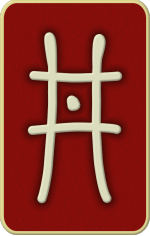
井 Jǐng The well (Replenish) [hexagram 48]


Water over Wind/Wood
 Water element
Water element
Lunar month: 5 ; Host (controlling) line : 6
The Decision
The town changes but not the well; the level does not decrease or increase. Coming and going, always drawing water. If the rope runs short or the bucket breaks, then misfortune.
Water over wood gives the idea of raising water from a well. It slakes thirst but is never exhausted. ‘The town changes but not the well’ – the center has inner strength. ‘If the rope runs short’ – does not fulfill its purpose. ‘The bucket breaks’ – this is most unfortunate.
井: 改邑不改井, 无丧无得, 往来井井. 汔至, 亦未繘井, 羸其瓶, 凶. Jǐng: gǎi yì bù gǎijǐng, wú sàng wú dé, wǎng lái jǐng jǐng. qì zhì, yì wèi yùjǐng, léi qí píng, xiōng.
彖传: 巽乎水而上水, 井; 井养而不穷也. 改邑不改井, 乃以刚中也. 汔至亦未繘井, 未有功也. 羸其瓶, 是以凶也. Tuàn zhuàn: Xùn hū shuǐ ér shàng shuǐ, jǐng; jǐng yǎng ér bù qióng yě. gǎi yì bù gǎi jǐng, nǎi yǐ gāng zhōng yě. qì zhì yì wèi yù jǐng, wèi yǒu gōng yě. léi qí píng, shì yǐ xiōng yě.
The Image
Water above wood forms ‘The well’. Consequently, the wise encourage everyone to help each other in their work.
象传: 木上有水, 井; 君子以劳民劝相. Xiàng zhuàn: Mù shàng yǒu shuǐ, jǐng; jūn zǐ yǐ láo mín quàn xiāng.
Line Change 1
The well’s water is so muddy it cannot be drunk. An ancient well deserted even by birds.
‘The well’s water is so muddy it cannot be drunk’ – weakness at the bottom. ‘An ancient well deserted even by birds’ – abandoned long ago.
初六: 井泥不食, 旧井无禽. Chū liù: jǐng ní bù shí, jiù jǐng wú qín.
象传: 井泥不食, 下也. 旧井无禽, 时舍也. Xiàng zhuàn: Jǐng ní bù shí, xià yě. jiùjǐng wú qín, shí shè yě.
Line Change 2
Leak in the well harbors fish. The bucket is broken and leaks.
‘Leak in the well harbors fish’ – nothing to offer.
九二: 井谷射鲋, 瓮敝漏. Jiǔ èr: jǐng gǔ shè fù, wèng bì lòu.
象传: 井谷射鲋, 无与也. Xiàng zhuàn: Jǐng gǔ shè fù, wú yǔ yě.
Line Change 3
The well is cleaned out but not used; lament the wasted resource. If the leader was wise all would have benefitted.
‘The well is cleaned out but not used’ – passers-by deplore it. There is hope that the leader’s wisdom will lead to abundance.
九三: 井渫不食, 为我心恻, 可用汲, 王明, 并受其福. Jiǔ sān: jǐng xiè bù shí, wèi wǒ xīn cè, kě yòng jí, wáng míng, bìng shòu qí fú.
象传: 井渫不食, 行恻也. 求王明, 受福也. Xiàng zhuàn: Jǐng xiè bù shí, xíng cè yě. qiú wáng míng, shòu fú yě.
Line Change 4
The well is being re-lined. No fault.
‘The well is being re-lined. No fault’ – restored to good condition.
六四: 井甃, 无咎. Liù sì: jǐng zhòu, wú jiù.
井甃无咎, 修井也. Xiàng zhuàn: Jǐng zhòu wú jiù, xiūjǐng yě.
Line Change 5
Clear, pure water from the well. Cool water can be avidly drunk.
‘Cool water can be avidly drunk’ – the position is central and appropriate.
九五: 井冽, 寒泉食. Jiǔ wǔ: jǐng liè, hán quán shí.
寒泉之食, 中正也. Xiàng zhuàn: Hán quán zhī shí, zhōng zhèng yě.
Line Change 6
Water drawn up to the top of the well without difficulty. Sincere and dependable – great good fortune.
‘Great good fortune’ – the top outcome is very auspicious.
上六: 井收勿幕, 有孚元吉. Shàng liù: jǐng shōu wù mù, yǒu fú yuán jí.
元吉在上, 大成也. Xiàng zhuàn: Yuán jí zài shàng, dà chéng yě.
The full set of 64 English translations is available in our new book 'Book of Changes - Deciphered' ➚.